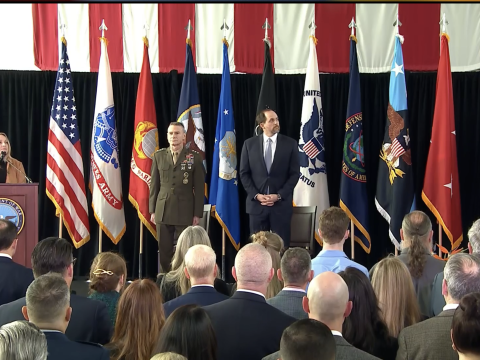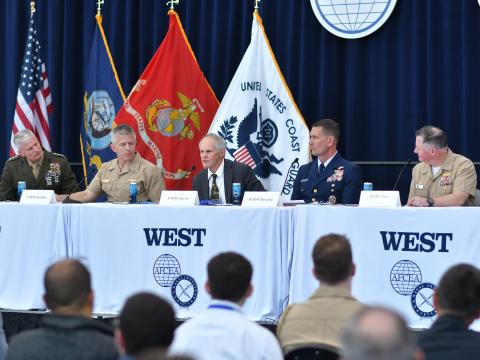U.S. Military Innovation Is a Blessing and a Curse
Culture and structure are a hindrance to innovation for U.S. national security, according to members of the Defense Innovation Board (DIB). The DIB held its open Winter Board Meeting at the Pentagon on February 1. Lt. Gen. Clinton Hinote, USAF, deputy chief of staff, Strategy, Integration, and Requirements, Headquarters, U.S. Air Force at the Pentagon, briefed the board on service innovation organizations, following Jason Rathje's presentation on behalf of the Office of Strategic Capital.
Gen. Hinote began his presentation with 16 reoccurring obstacles he has witnessed throughout his career within the Department of Defense (DoD). “Each of these stifle innovation on behalf of the bureaucracy and at the expense of tomorrow’s warfighter.”
With due credit given to Ukraine’s warfighters, Gen. Hinote asserted that the United States must adapt just as well as the Ukrainians have. “I’ve never seen data used so well in avoiding attacks and prosecuting attacks,” he expressed. “If we can be half as adaptive as the Ukrainians have been, then it makes all of our long-held investments in these systems all the best.”
“There are a lot of people in uniform that identify with the old way of doing things as opposed to the new, disruptive ways." Though the former fighter pilot understands the perspective of those dedicated to past warfare, Gen. Hinote said that refusal to let go of previous standards only obstructs progress.
“Often I am asked what kind of capabilities airmen will need in 2038; I have no idea,” Gen. Hinote stated.
Predicting the future of the battleground has become much more complex with today’s technological advancement. “We have a lack of awareness about what really is going on in the technology space, so it’s impossible for us to know how that might change our fighting because we just aren’t aware of it,” the general noted. Using science & technology (S&T) laboratories as an example, Gen. Hinote pointed at the competition between internal and external S&T, both driven through commercial incentives. “While I don’t mind the competition … I do mind when the internal organizations have a soft veto on the external organizations,” he said, speaking about timelines and budgets.
Startup companies that have ownership over many necessary technologies for the nation’s troops are repeatedly faced with lack of capital. “It can’t be true that the only way a small startup can work with the DoD is that they have to self-fund for two years or more.”
He emphasized the importance of trust for the well-being of national security. “We’re going to have to explore what types of transparency we need to get our congressional stakeholders semi-comfortable with the type of flexibility that we know we have to get to.”
Incentivizing intellectual property must be a priority, Gen. Hinote stated, as he suggested working closely with the nation’s allied partners to manufacture weapons faster.
The general recalled a recent meeting he held with a company that had received an investment just under $50 million—plus more than $800 million raised from venture capital. “And then I hear from one of our senior leaders … if we start developing a capability today, it won’t be ready until 2032.” Gen. Hinote shared his frustration with the board. “I don’t think any of you who are in private capital would allow anybody to say that. But we literally say it to ourselves all the time.”
Gen. Hinote stressed that risk-taking is imperative while pushing the bounds of technology for the success of the DoD.
“We’re so blessed to have the best innovation ecosystem … we’re not taking advantage because of culture,” Gen. Hinote continued, explaining further that current incentives are structured in a way that make starting necessary innovative projects impossible. “I’m passionate about this because I’ve seen it happen, and I’ve seen some successes but a lot more failures. And I believe that we can and should take advantage of what we’ve got as a country.”
"I believe this board has a voice,” Gen. Hinote said.
The DIB was established in 2016 under the Federal Advisory Committee Act to provide recommendations to the DoD. The board, which is made up of individuals from government, industry and academia, comes together to collaborate on ideas to address national security challenges and successes.





Comments